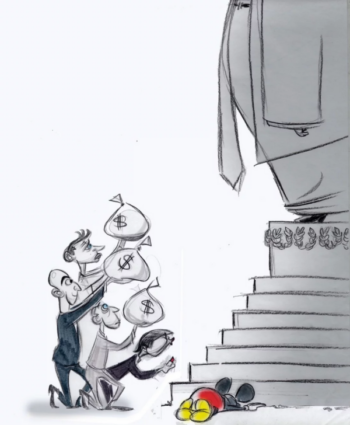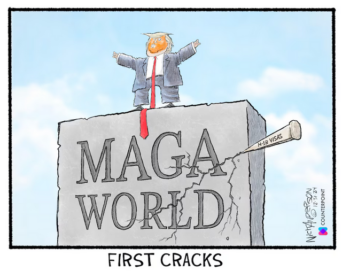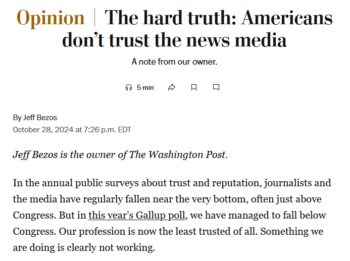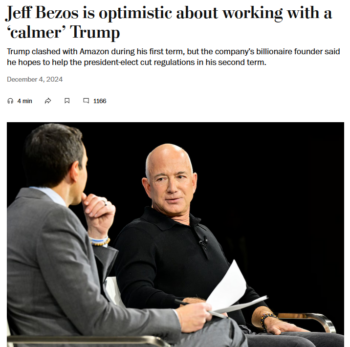
The cartoon that was rejected by the Washington Post, definitely not because it portrayed Post owner Jeff Bezos in an unflattering light.
When Ann Telnaes, a Pulitzer Prize–winning Washington Post cartoonist, submitted a draft sketch shortly before Christmas, she must have known she was stirring the pot.
But after watching a parade of Big Tech CEOs jet down to Mar-a-Lago to pay homage—and millions of dollars—to Trump, a cartoon depicting these groveling billionaires must have seemed natural, even if it included her own boss, Jeff Bezos, the founder of Amazon and owner of the Post since 2013.
“The cartoon that was killed criticizes the billionaire tech and media chief executives who have been doing their best to curry favor with incoming President-elect Trump,” Telnaes wrote in a Substack post (1/3/25) announcing her resignation from the Post, where she’s worked since 2008. “I’ve never had a cartoon killed because of who or what I chose to aim my pen at. Until now.”
Telnaes’ post went further, criticizing media owners like Bezos for abandoning their responsibility to safeguard the free press “to get in the good graces of an autocrat-in-waiting.”
In addition to Bezos, the other billionaires Telnaes depicted bowing before Trump were Meta CEO Mark Zuckerberg, OpenAI’s Sam Altman and LA Times owner Patrick Soon-Shiong.
And lying prostrate beneath these men was Mickey Mouse, Telnaes’ apparent nod to the cowardly $16 million settlement Disney-owned ABC recently offered Trump (FAIR.org, 12/16/24).
‘Bias against repetition’

Somehow the Washington Post running a column by Adam Lashinsky (12/30/24) about MAGA’s internecine battles over H-1B visas didn’t prevent it from publishing a cartoon on the same theme the next day (12/31/24)—or another one the next week (1/4/25).
The unenviable job of ensuring a thin-skinned Bezos wasn’t embarrassed by a cartoon in his own newspaper fell to Post opinions editor David Shipley. “Not every editorial judgment is a reflection of a malign force,” Shipley said in a statement justifying his killing of Telnaes’ cartoon:
My decision was guided by the fact that we had just published a column on the same topic as the cartoon and had already scheduled another column—this one a satire—for publication. The only bias was against repetition.
It’s bizarre to argue that a regular cartoonist’s work should be killed because the paper published a column—or even two!—with similar content. Even so, we can only find one recent Post opinion column addressing Bezos’ efforts to curry favor with the president-elect (12/18/24).
What’s more, a search of the Post’s “latest cartoons” shows the paper has no problem publishing cartoons on the same topic as opinion pieces. Recent examples include Republicans’ difficulties finding a speaker (1/2/25, 1/4/25), Republican infighting over H-1B visas (12/30/24, 12/31/24, 1/4/25) and controversy over Biden’s death penalty commutations (12/23/24, 12/26/24).
Outside of opinions, the Post has run a few recent stories on the efforts of Big Tech executives, including Bezos, to mollify Trump (12/13/24, 12/19/24, 12/31/24).
Aside from repetitiveness, deputy opinions editor David Von Drehle offered another reason for spiking Telnaes’ cartoon. “I didn’t think it was a very good cartoon. It seemed pretty ham-handed to me,” Von Drehle told Post media critic Erik Wemple (1/6/25).
Wemple’s blog post also disclosed that Post executive editor Matt Murray wants the paper to stop covering its own problems. “I did set a policy that broadly we should not cover ourselves,” said Murray, who claimed his change was made weeks ago and wasn’t “specifically tied to the cartoon.”
Von Drehle’s denigrating comment about Telnaes’ cartoon only appeared in Wemple’s blog, not in a Post news story. In fact, amid the swirling controversy, the Post hasn’t written a single original news story on the spiked cartoon, only running an AP story (1/4/25) on the topic.
Exodus of talent

“It would be easy to blame others for our long and continuing fall in credibility,” wrote Washington Post owner Jeff Bezos (10/28/24) in a column that did just that.
Following the rejection of her cartoon, Telnaes resigned, marking just the latest departure from the storied paper.
“The Post is shedding talent at an unprecedented rate,” observed media journalist Oliver Darcy (Status, 1/6/25), who earlier noted (1/2/25): “Eventually treating employees with little respect has consequences.”
The growing exodus comes in the wake of Bezos spiking the Post’s endorsement of Kamala Harris in late October—a move he took to curry favor with Trump (FAIR.org, 10/30/24).
Amid the ensuing backlash—in which 300,000 Post readers reportedly canceled their subscriptions—Bezos scapegoated Post reporters for his craven action, claiming their untrustworthiness had forced him to abandon the paper’s longstanding practice of issuing presidential endorsements. “The Hard Truth: Americans Don’t Trust the News Media,” was the headline accompanying Bezos’ self-serving op-ed (Washington Post, 10/28/24).
Ingratiation ratcheted up

Jeff Bezos (Washington Post, 12/4/24) said he hopes to persuade Donald Trump that the press is “not the enemy”—in part by giving him a $1 million donation.
After Trump’s win, Bezos ratcheted up his ingratiation, saying Trump has “grown in the past eight years” and is now “calmer.” Bezos also told the New York Times’ Dealbook conference he’s “very optimistic” about Trump’s second term, and hopes to work with him (Washington Post, 12/4/24).
“He seems to have a lot of energy around reducing regulation, and if I can help him do that, I’m going to help him,” Bezos said. “We do have too much regulation in this country.”
Bezos also trekked down to Mar-a-Lago, gifts in hand—just as Telnaes depicted. In addition to ponying up $1 million for Trump’s inauguration fund, Amazon is also broadcasting the inauguration live on Amazon Prime, an in-kind donation worth another $1 million (BBC, 1/4/25). Meanwhile, Amazon will release a new documentary on Melania Trump, who’s an executive producer of the film; Bezos’ company reportedly paid $40 million for the rights (Puck, 1/7/25).
Bezos didn’t become the second-richest person alive by prioritizing civic responsibility. “With Jeff, it’s always only about business,” a former employee of Bezos’ space company, Blue Origin, told the Post (10/30/24). “It’s business, period. That’s how he built Amazon. That’s how he runs all of his enterprises.”
Meanwhile at the Post, the paper today “started laying off roughly 4% of its work force” (New York Times, 1/7/25).
ACTION ALERT: You can send a message to the Washington Post at letters@washpost.com.
This post was originally published on FAIR.